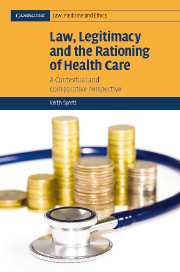Book contents
- Frontmatter
- Contents
- Table of Cases
- Acknowledgements
- 1 Introduction
- 2 Why ‘Ration’ Healthcare Resources?
- 3 How Rationing Takes Place
- 4 Rationing and the Problem of Legitimacy
- 5 Rationing and the Courts: Theoretical Perspectives
- 6 Rationing in the Courts: England
- 7 Rationing in the Courts: Canada
- 8 Rationing in the Courts: South Africa
- 9 Conclusion
- Index
6 - Rationing in the Courts: England
Published online by Cambridge University Press: 27 July 2009
- Frontmatter
- Contents
- Table of Cases
- Acknowledgements
- 1 Introduction
- 2 Why ‘Ration’ Healthcare Resources?
- 3 How Rationing Takes Place
- 4 Rationing and the Problem of Legitimacy
- 5 Rationing and the Courts: Theoretical Perspectives
- 6 Rationing in the Courts: England
- 7 Rationing in the Courts: Canada
- 8 Rationing in the Courts: South Africa
- 9 Conclusion
- Index
Summary
Introduction: the incidence of legal challenge
In the preceding chapter, it was noted that litigation on questions of healthcare rationing is emerging as an increasingly frequent occurrence in light of evolving social and political trends, coupled with the increasing public visibility of strategies of rationing. In the field of public law, to which the discussion in this text is restricted, a superficial survey of the law reports would seem to bear out the validity of this observation. For example, in England there were very few legal challenges to the allocation of healthcare resources from the establishment of the NHS in 1948 until the ‘Child B’ case in the mid-1990s, but there have been several more in the ensuing decade (not to mention threats to initiate litigation which have failed to crystallise into a legal case). The impact of human rights law should also be recognised. In both Canada and South Africa – although to a much lesser extent in England – litigants have formulated legal challenges to decisions not to provide medical treatments and services on the basis of the alleged violation of a human right. As will be noted below, this has occurred indirectly in the case of the Canadian Charter of Rights and Freedoms, which protects only rights of a civil and political nature, and directly in the case of the Constitution of South Africa, which contains a legally enforceable right to access healthcare services.
- Type
- Chapter
- Information
- Law, Legitimacy and the Rationing of Health CareA Contextual and Comparative Perspective, pp. 159 - 178Publisher: Cambridge University PressPrint publication year: 2007



